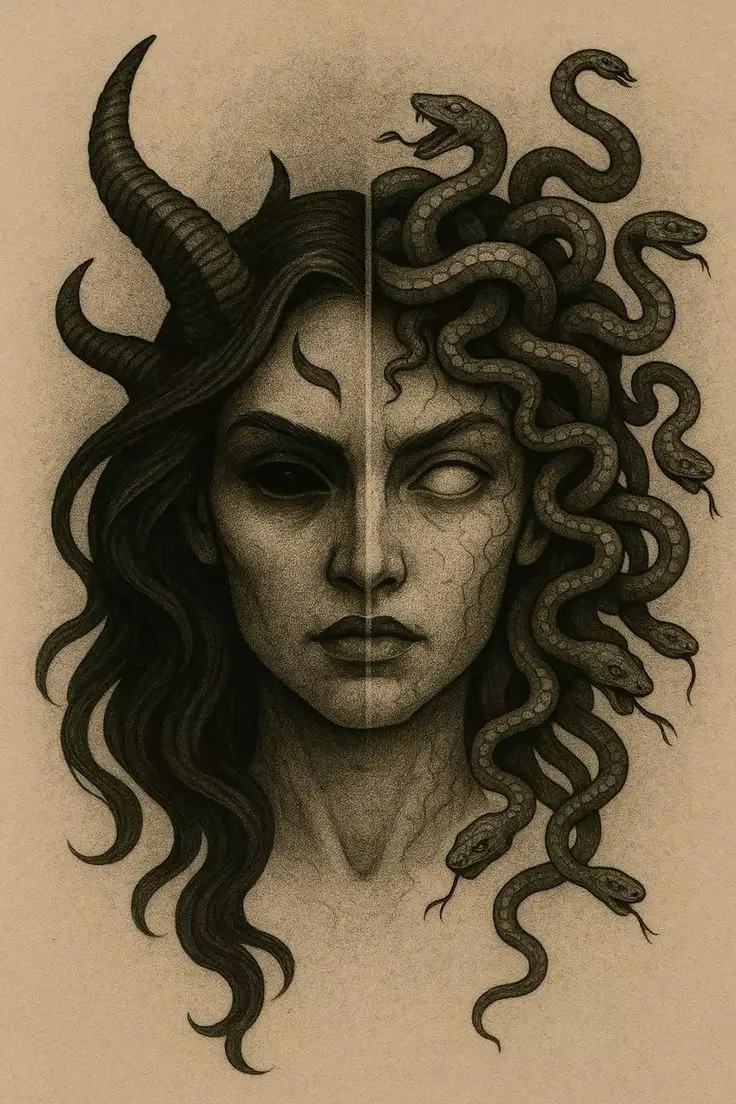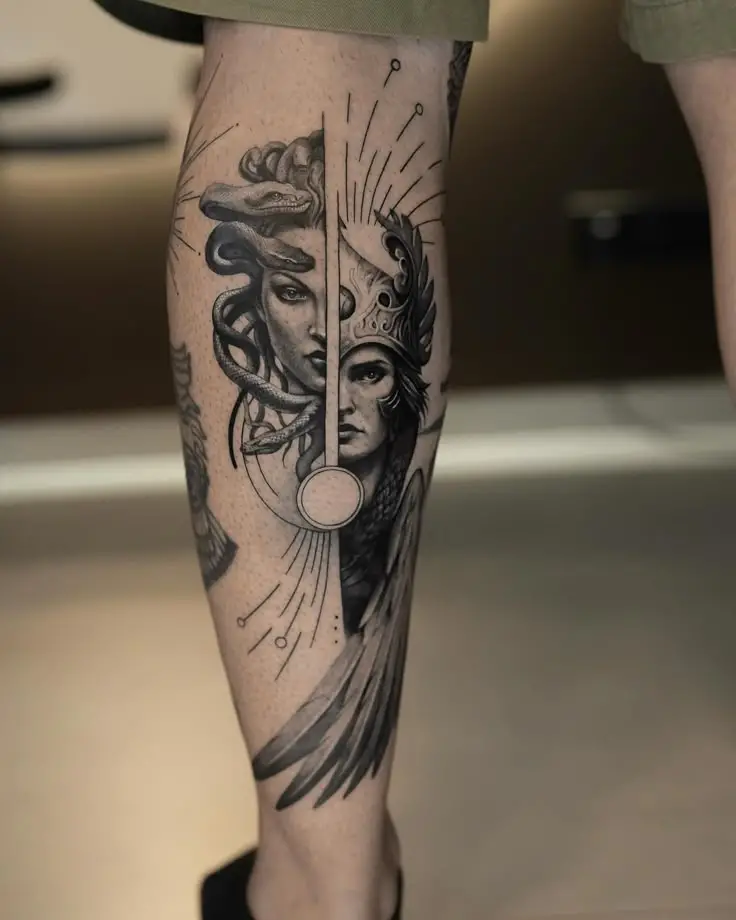
The allure of tattoos lies in their ability to embody personal stories, mythological symbolism, and cultural significance. Among the many captivating motifs, the Medusa tattoo stands out for its rich mythology, fierce symbolism, and intricate design possibilities. The medusa tattoo meaning extends beyond mere aesthetics; it resonates with themes of transformation, power, protection, and defiance. Whether you’re contemplating a tattoo medusa or simply intrigued by medusa meaning, understanding its layered symbolism can inspire a meaningful body art choice that reflects your identity and beliefs.
A medusa tattoo is more than a striking visual; it encapsulates complex emotional and psychological narratives. The medusa meaning has evolved over centuries, transforming from a symbol of pagan myths to a modern emblem of resilience and empowerment. When considering a medusa tattoo, it’s essential to explore the different facets that make this mythological figure so compelling.
Medusa’s image often evokes feelings of fear, fascination, and empowerment. Its meaning varies depending on cultural context, personal interpretation, and artistic style. For some, it symbolizes danger and protection—an entity that ward off evil. For others, it signifies transformation, human vulnerability, or a reclaiming of power. The following subsections delve into these multifaceted interpretations, shedding light on why so many choose to immortalize Medusa in their ink.
Medusa as a symbol of transformation and rebirth

A central theme in medusa tattoo meaning is transformation. In Greek mythology, Medusa was once a beautiful maiden whose life changed dramatically after being cursed by Athena. Her transformation from beauty to monstrousness can be seen as a metaphor for personal growth and resilience.
This symbolic interpretation resonates with individuals who have experienced significant life changes, hardships, or personal evolution. A tattoo medusa serves as a reminder that even in adversity, one can find strength and emerge renewed. It embodies the idea that suffering and pain are catalysts for change, fostering inner growth and resilience.
Personal insights: Many people opt for a Medusa tattoo after overcoming difficult circumstances, such as trauma, loss, or career setbacks. The myth’s narrative of transformation provides inspiration for embracing change rather than resisting it. This perspective transforms Medusa from a symbol of horror into a beacon of hope and renewal.
Medusa as a protector and guardian figure
In some cultures, images of Medusa have been used as apotropaic symbols—objects believed to ward off evil spirits and protect against harm. The medusa tattoo meaning in this context revolves around her role as a guardian.
The serpent-haired Gorgon’s fierce visage acts as a powerful deterrent to malevolent forces. When inked as a tattoo, Medusa can serve as a protective talisman, especially for those seeking to guard themselves or loved ones from negative influences.
Cultural significance: Historically, Medusa’s head was depicted in ancient Greek architecture and jewelry as a protective emblem. Modern interpretations continue this tradition, with many choosing a tattoo medusa to symbolize strength, protection, and resilience in the face of life’s challenges.
Medusa as a symbol of feminine power and independence
In contemporary feminist discourse, Medusa is increasingly viewed as an icon of female empowerment. Her story embodies resistance to victimization, assertiveness, and the reclamation of agency.
A medusa tattoo can be a bold statement reflecting independence and empowerment. It challenges traditional narratives rooted in victimhood, instead highlighting strength and autonomy.
Personal analysis: Women and gender non-conforming individuals often select Medusa tattoos to celebrate their strength and reject societal stereotypes. Her serpents symbolize wisdom and fierce independence, making her an ideal muse for those determined to assert their power.
Artistic representations and variations in medusa tattoo meaning
The versatility of Medusa’s imagery allows for a wide spectrum of artistic expression, each adding layers of meaning. The medusa tattoo can range from realistic portraits to abstract designs, each influencing the Medusa meaning conveyed.
From fierce, intimidating depictions to serene, contemplative portrayals, the tone of the tattoo impacts its symbolism. Artists often incorporate elements like snakes, mirrors, or armor to deepen the narrative. Understanding these variations helps individuals choose designs aligned with their personal medusa tattoo meaning.
Tattoo medusa
Deciding to get a tattoo medusa involves much more than selecting a design. It requires thoughtful consideration of symbolism, size, style, and placement. The tattoo medusa can be a deeply personal emblem or a statement piece, depending on the wearer’s intention.
This section explores various aspects of getting a tattoo medusa, including design options, stylistic influences, and practical considerations for body art enthusiasts.
Design styles and artistic interpretations of tattoo medusa
The visual representation of Medusa in tattoos is incredibly diverse. Artists leverage different styles to evoke specific medusa meaning and emotional responses.
Realistic and portrait-style tattoos: These emphasize detailed facial features and lifelike snakes, often capturing Medusa’s fierce gaze. Such designs highlight her mythological power and can carry intense emotional impact.
Abstract and surreal interpretations: Using bold colors, geometric shapes, or imaginative distortions, these styles focus on conveying symbolic concepts like transformation or inner strength.
Traditional and neo-traditional: Incorporating classic tattoo elements such as bold lines and limited color palettes, these designs tend to give Medusa a timeless yet modern feel. They often emphasize her protective qualities.
Minimalist and line art: Simplified depictions strip down Medusa to essential features, creating sleek, elegant designs. Despite their simplicity, these tattoos can carry profound medusa meaning related to clarity and focus.
Placement considerations for a tattoo medusa
Choosing where to place your tattoo medusa significantly impacts its visibility, symbolism, and personal significance. Popular placements vary based on size and style preferences.
Arm and forearm: Visible and accessible, these locations allow for detailed work and easy display. They symbolize strength and self-awareness.
Back and shoulder: Offering ample space for intricate designs, these areas can be concealed or revealed as desired, signifying control over one’s presentation.
Chest and ribcage: More private locations, suitable for larger, detailed pieces. They often represent deeply personal meanings related to inner strength.
Legs and calves: Versatile placements that balance visibility and discretion, ideal for dynamic designs that emphasize movement or growth.
Practical tips for getting a tattoo medusa
Preparation is key to ensuring a successful tattoo experience. For a tattoo medusa, consider factors like design customization, artist selection, and aftercare.
- Research tattoo artists: Find professionals with a portfolio that aligns with your preferred style, whether realism, watercolor, or illustrative.
- Design customization: Collaborate with your artist to adapt Medusa’s imagery to reflect your personal medusa meaning. This might involve adjusting facial expressions, color schemes, or surrounding elements.
- Placement planning: Think about how the placement affects your daily life, clothing choices, and long-term visibility.
- Aftercare: Follow designated care instructions meticulously to preserve detail and prevent infections, especially for large or elaborate tattoo medusa pieces.
Cultural sensitivities and modern interpretations
While traditional depictions of Medusa stem from Greek mythology, modern medusa tattoo interpretations often reflect contemporary values and perspectives. Some see her as a symbol of female empowerment or resilience, challenging older narratives of victimization.
It’s essential to approach tattoo medusa with respect for its origins and cultural significance. Sensitivity to varying medusa meaning ensures that the tattoo remains a meaningful and respectful reflection of personal belief systems.
Medusa meaning
Understanding the medusa meaning involves exploring her mythological roots, cultural symbolism, and evolving representations in art and popular culture. As a figure steeped in legend and symbolism, Medusa embodies contradictions—beauty and horror, victim and victor, protector and threat.
This section examines the historical, mythological, and modern medusa meaning, providing insights into why she continues to inspire countless individuals worldwide.
The mythological origins and evolution of Medusa
Medusa’s story begins in ancient Greek mythology, where she was one of the three Gorgon sisters. Unlike her siblings, Stheno and Euryale, Medusa is unique because of her mortal status and distinctive appearance—covered in serpents with a gaze capable of turning people to stone.
Her myth has shifted over time, reflecting changing societal values. Originally feared as a monster, she later became a symbol of power and protection, especially when her severed head was used as a talisman or emblem.
Mythical symbolism: Medusa’s transformation from a beautiful maiden into a monster highlights themes of punishment, innocence, and the destructive nature of divine wrath. Her story warns against hubris but also underscores resilience, as she later becomes an apotropaic symbol.
Medusa as a cultural icon
Through centuries, Medusa has transcended myth to become a cultural icon in art, literature, and popular media. Her image appears in sculptures, paintings, fashion, and tattoo art, each interpretation adding layers to her medusa meaning.
In modern times, Medusa is embraced by feminist movements, representing female strength, independence, and rebellion against victimization. Her serpentine hair symbolizes wisdom, transformation, and raw power.
Pop culture references: Films, books, and comics have reimagined Medusa, emphasizing her complexities and inspiring new medusa meaning that resonates with contemporary audiences. She embodies both chaos and order, destruction and renewal.
Psychological and philosophical interpretations
Psychologically, Medusa can symbolize confronting fears and embracing shadow aspects of oneself. Facing her gaze in a medusa tattoo may signify self-awareness, acceptance, and mastery over internal demons.
Philosophically, she challenges notions of beauty and monstrosity, urging individuals to redefine perceptions and find strength within perceived imperfections. Her story encourages introspection about identity, power, and societal expectations.
Personal connection and medusa tattoo meaning
For many, the medusa tattoo is a highly personalized emblem. Some see her as a protector, others as a reminder of resilience, and some as a symbol of liberation from societal constraints. The multifaceted medusa meaning allows for deep personal connection, making her an enduring motif for body art.
The ongoing reinterpretation of Medusa’s story reflects evolving cultural attitudes towards femininity, power, and transformation, ensuring her relevance across generations.
Conclusion
The medusa tattoo meaning is a tapestry woven from myth, symbolism, and personal significance. Whether viewed as a guardian, symbol of transformation, or feminist icon, Medusa embodies complex themes of resilience, empowerment, and inner strength. The artistry involved in creating a tattoo medusa allows each individual to tailor her image to reflect their unique medusa meaning—a testament to her enduring legacy in human consciousness. As body art, Medusa remains a powerful emblem of confronting fears, embracing change, and asserting independence, making her an eternally compelling figure for those seeking meaningful and impactful tattoo designs.

